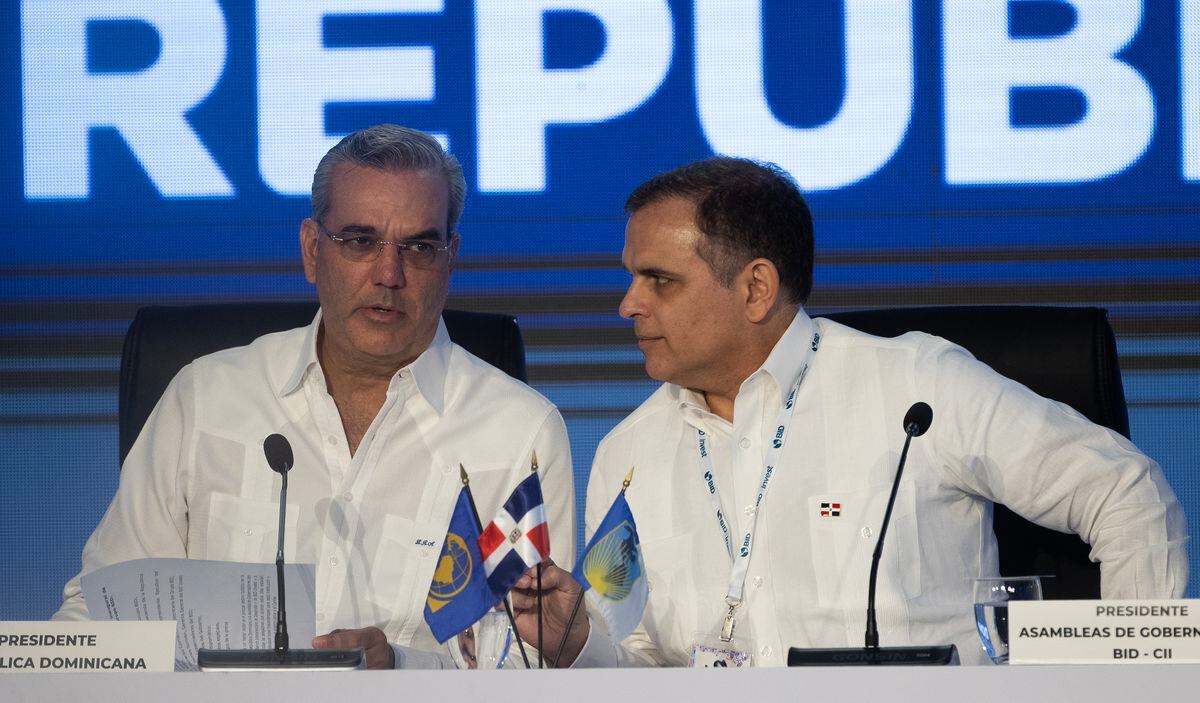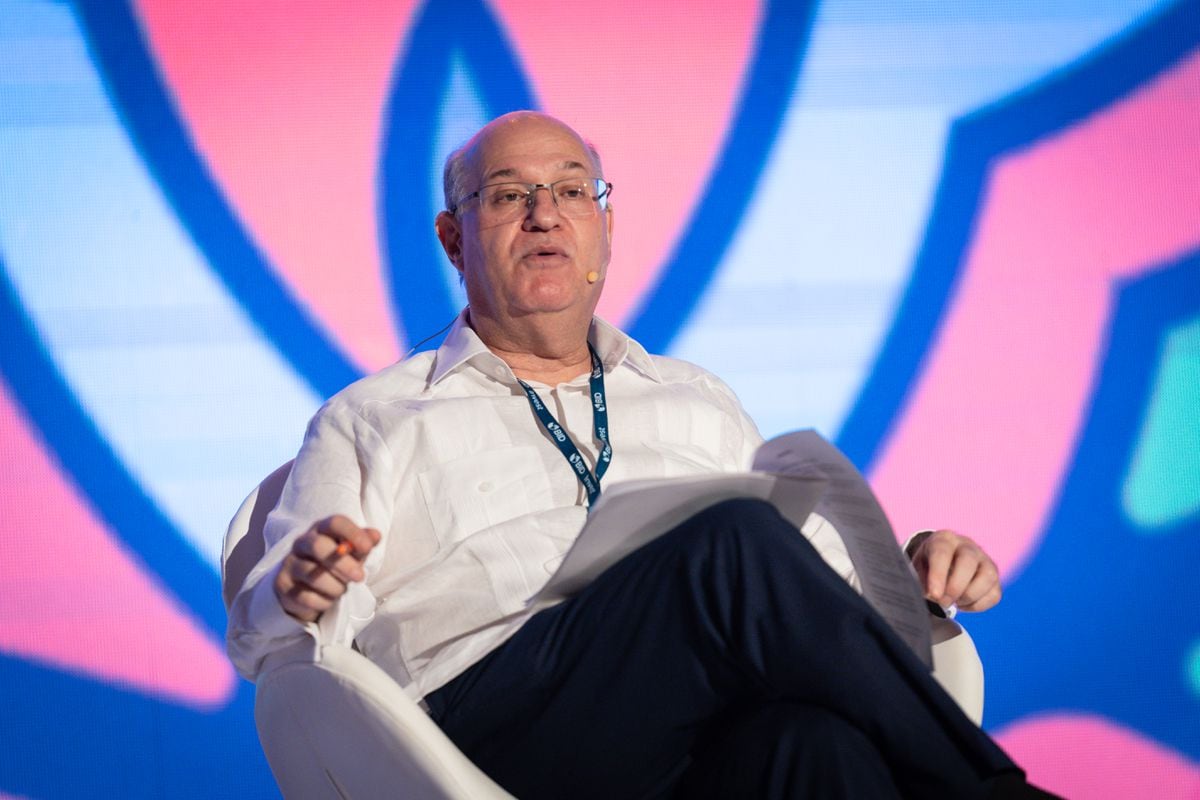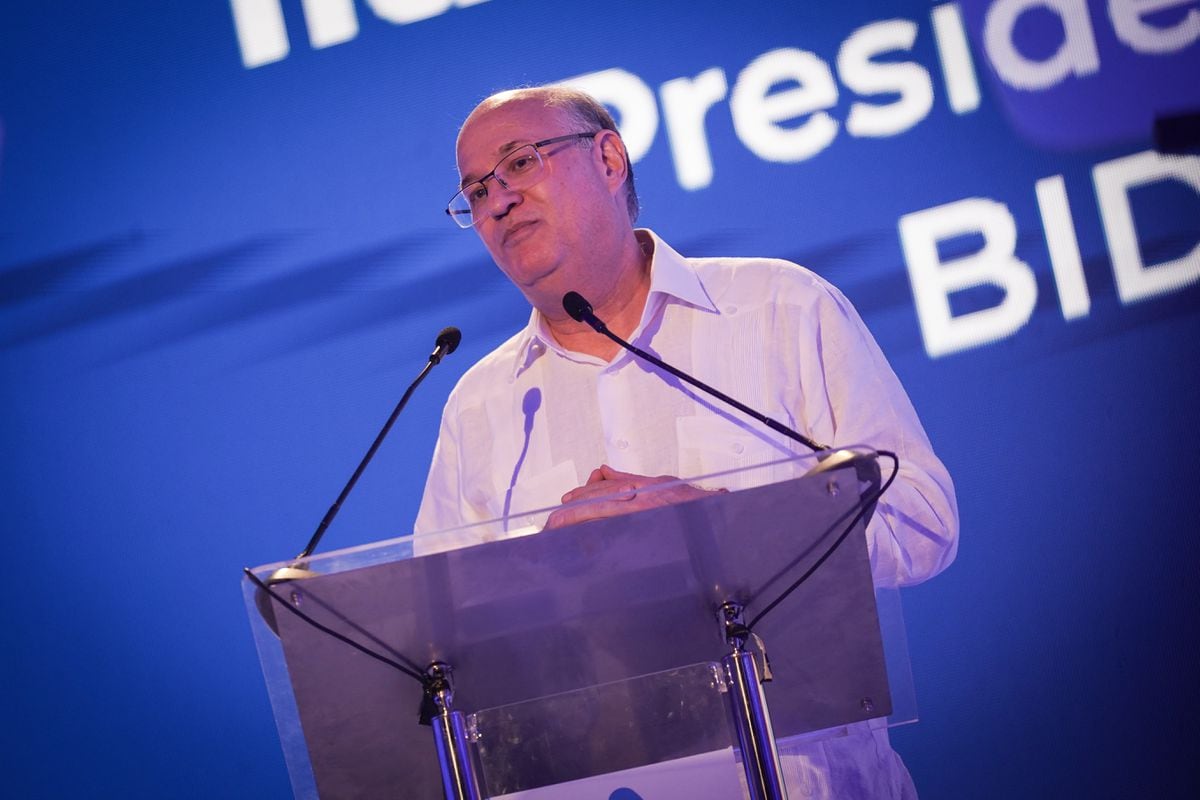Gerardo Esquivel, candidate for the presidency of the Inter-American Development Bank (IDB) during an interview at the Mexican Embassy in Washington, DC, November 16, 2022.WILL OLIVER (EFE)
Gerardo Esquivel (Mexico City, 56 years old) had barely a week to campaign and compete for the presidency of the Inter-American Development Bank (IDB), the largest development multilateral in Latin America and the Caribbean.
The doctor in Economics from Harvard University comes to take over from Alicia Bárcena, one of the most experienced Mexican diplomats, who opted to leave the race shortly before the election to be held on Sunday, November 20.
By video call from a room in the Mexican Embassy in Washington, Esquivel spoke with EL PAÍS about how important this election is for the institution, since it is going through a difficult situation.
“It is relevant that the institution manages to get back on track after a quite negative and complicated period,” says Esquivel, who serves as deputy governor of the Mexican central bank.
"The best thing is that the institution, for the good of the region, manages to resume its course," he points out.
Question:
Are you referring to the fact that the previous president, Mauricio Claver-Carone, was removed from his post?
Response.
Yes, but beyond that, what I have found in conversations with IDB officials and staff is a situation in which the communication channels were broken and an unconstructive dynamic began between the bank's management and the Executive Board.
In my opinion, that prevented the institution from concentrating on the substantive.
There had always been a president from the Latin American region, which includes the Caribbean, and normally significant weight was given to the United States, which, being the main shareholder, has 30% of the representation.
Normally, this was combined with an executive vice-presidency in charge of the United States. Two years ago it was decided to change that and it was decided to elect for the first time a president of the bank that was not Latin American, not from the Caribbean, but an American president.
That broke the balances that were more or less established.
And I think that the dynamics did change and it was, I insist, very unproductive for the institution that finds itself in a situation of institutional weakness, fragility and low morale.
The
staff
He manifests it himself in various ways because he feels that the institution was much more involved in internal conflicts than in meeting the needs for which it was created.
Fortunately, it was decided to remove the president from office, later this new process was opened and the countries of the region presented their candidates.
In general, they are candidates of a very good level and profile, and the US is no longer claiming to occupy the presidency.
The recovery of the institution for the region is important, but it has to be, not only in form, but in substance.
In other words, that the institution is really allowed to act for the benefit of the region and that it is not seen as a disguised attempt to continue maintaining control of the institution, but rather that it is seen as something that is granted to the institution,
Q.
If you were to become president, what would you do to avoid breaking the unwritten agreement that the position should be held by a country from the region?
R.
It is not necessary to change the rules because there is already a very important counterweight that is the Executive Board, which is made up of the representatives of the countries and there is an assembly of governors, who are the ministers of the countries, who at the time took the decision to remove the president from office.
That is, the counterweights already exist and work.
The same assembly of governors that at the time accepted that Claver-Carone be president later agreed to remove him for these factors.
In that sense, the institution has that design and I don't think it needs to be changed.
Q.
What is your vision of the IDB?
R.
The IDB is obviously important for the region because it lends resources at rates accessible to the different governments in the region, but it is much more than that.
In addition to lending money, a non-trivial amount of resources, it also provides a lot of advice and technical training, it accompanies governments to start implementing things.
And a lot of this is free, by the way.
Then there is a part of identifying the best practices of public policies in the countries, in such a way that it can function as a kind of supranational entity.
It is a disseminator of knowledge, but it can also be an instrument that allows the region to be led in the implementation of some public policies and some reforms that are considered relevant.
It can become like a guide to the region, a kind of
soft power
that has nothing to do with money and that has to do more with the ideas and vision that can be transmitted.
That is why I can lead an institution like this, because I am presenting a much broader vision than what is normally associated with a financial institution.
You have to act in the health, education, and infrastructure aspects, you have to act in other aspects that are sometimes not necessarily associated with an investment project.
It can be a guide in the implementation of reforms to the judicial system of tax reforms.
The IDB can help in all this.
Q.
If you win the election, you would be president of the IDB Group, which includes the private arm of the bank, IDB Invest.
This year, it withdrew, for the first time in its history, funding due to the social conflicts it generated.
How would you make sure this doesn't happen in the future?
R.
This is a case that illustrates institutional strength.
One of the advantages of the IDB is that it has several independent offices: it has an office that evaluates projects and an office that is in charge of when communities demand a project.
This is what allows decisions like these to take place to withdraw financing from projects that, perhaps, were not envisioned of the impact they would have on certain communities.
But if they are identified as having this situation, the IDB can act accordingly.
The mechanisms are
They must be used correctly and given weight and importance.
IDB Invest is a very important private arm and is surely the dimension that should grow the most in the future.
This is because the public window, that is, loans to governments, has finite amounts and its impact may be limited.
Q.
You define yourself on the left.
Do you think it is a disadvantage in this contest?
R.
It shouldn't be, as the region itself has chosen a path in that direction.
There are ideological fluctuations, but one thing is the ideology that one has personally and another thing is the orientation of an institution.
That one has that vision does not necessarily have to transcend the institution itself.
What matters here is, first, having the appropriate technical qualifications, such as the leadership that an institution like this requires and in these times.
I think that the most personal dimension of my personal, political or ideological preferences has passed into the background.
Obviously, when I say that I am from the left, I mean that I have a social concern and I believe that this is incompatible with the objectives of a development institution like this one.
An institution like this has its origins in the search for social development and economic integration, principles with which I fully agree.
Later, they added to these mandates the issue of poverty and inequality, with which I very much agree.
Now, the IDB has new demands and objectives that have to do with combating climate change and promoting inclusion, especially gender, things with which I also agree given my vision.
We all have an ideological position, and I believe that it is much more valid to be transparent about the flags that one hoists and the struggles for which one is willing to give, than to hide under a veil, let's say, of neutrality or anti-politics that I consider to be false. or does not exist in reality.
In that sense, I am more transparent.
principles with which I fully agree.
Later, they added to these mandates the issue of poverty and inequality, with which I very much agree.
Now, the IDB has new demands and objectives that have to do with combating climate change and promoting inclusion, especially gender, things with which I also agree given my vision.
We all have an ideological position, and I believe that it is much more valid to be transparent about the flags that one hoists and the struggles for which one is willing to give, than to hide under a veil, let's say, of neutrality or anti-politics that I consider to be false. or does not exist in reality.
In that sense, I am more transparent.
principles with which I fully agree.
Later, they added to these mandates the issue of poverty and inequality, with which I very much agree.
Now, the IDB has new demands and objectives that have to do with combating climate change and promoting inclusion, especially gender, things with which I also agree given my vision.
We all have an ideological position, and I believe that it is much more valid to be transparent about the flags that one hoists and the struggles for which one is willing to give, than to hide under a veil, let's say, of neutrality or anti-politics that I consider to be false. or does not exist in reality.
In that sense, I am more transparent.
with which I very much agree.
Now, the IDB has new demands and objectives that have to do with combating climate change and promoting inclusion, especially gender, things with which I also agree given my vision.
We all have an ideological position, and I believe that it is much more valid to be transparent about the flags that one hoists and the struggles for which one is willing to give, than to hide under a veil, let's say, of neutrality or anti-politics that I consider to be false. or does not exist in reality.
In that sense, I am more transparent.
with which I very much agree.
Now, the IDB has new demands and objectives that have to do with combating climate change and promoting inclusion, especially gender, things with which I also agree given my vision.
We all have an ideological position, and I believe that it is much more valid to be transparent about the flags that one hoists and the struggles for which one is willing to give, than to hide under a veil, let's say, of neutrality or anti-politics that I consider to be false. or does not exist in reality.
In that sense, I am more transparent.
We all have an ideological position, and I believe that it is much more valid to be transparent about the flags that one hoists and the struggles for which one is willing to give, than to hide under a veil, let's say, of neutrality or anti-politics that I consider to be false. or does not exist in reality.
In that sense, I am more transparent.
We all have an ideological position, and I believe that it is much more valid to be transparent about the flags that one hoists and the struggles for which one is willing to give, than to hide under a veil, let's say, of neutrality or anti-politics that I consider to be false. or does not exist in reality.
In that sense, I am more transparent.
Q.
You were the penultimate of the four candidates to enter the race, after Alicia Bárcena was the nominee for weeks.
How has this situation of taking over where one of the most recognized diplomats in the region left off?
R.
First of all, I am very sorry for the fact that someone like Alicia Bárcena, whom I respect and appreciate very much, had to retire and I hope that her personal and family situation improves soon.
And second, well, it is so.
These are the circumstances of the situation in which I was invited, at a moment very close to the end of the record.
I have a week of campaigning, which is short, but I think it is enough time to send a message about the things that I intend to raise.
I accepted, no one forced me.
I said yes because I was willing to come this week to dedicate whatever was necessary.
Q.
Why should Mexico win this election?
R.
The country had the presidency of the IDB in 1971, when Antonio Ortiz Mena took it for 17 years and I think that this is a good opportunity for Mexico to return to the post.
It is an important moment for the region after this situation.
It is time to have a president who has legitimacy, who is not like the previous time the US tried to control the IDB.
It is time to guarantee the region the possibility of having a president who is authentically from the region who will look after its interests.
And that they have a vision for the future, which is what I am offering.
subscribe here
to the EL PAÍS México
newsletter
and receive all the key information on current affairs in this country


/cloudfront-eu-central-1.images.arcpublishing.com/prisa/2KVLLY26ZNGK3OCBRI676KYGKA.jpg)

/cloudfront-eu-central-1.images.arcpublishing.com/prisa/IOQ5LVJEOFAEZHGFMYWVXLFURI.jpg)
/cloudfront-eu-central-1.images.arcpublishing.com/prisa/F5MUQT6JFZFAZGDYBYG5BZQJIQ.jpg)


/cloudfront-eu-central-1.images.arcpublishing.com/prisa/67ULYPVUPVBKREGACL4UVH4JH4.jpg)
/cloudfront-eu-central-1.images.arcpublishing.com/prisa/4PKPLHZOXBG5TEAQ6JNDTUJXBA.jpg)





